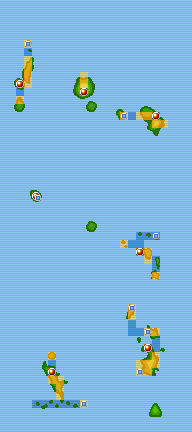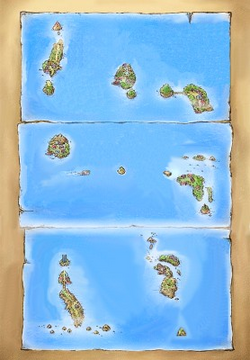Sevii Islands: Difference between revisions
No edit summary |
Dann Woolf (talk | contribs) No edit summary |
||
| Line 71: | Line 71: | ||
* Even though {{2v2|HeartGold|SoulSilver}} are considered to be the sequels to {{2v2|FireRed|LeafGreen}}, like how {{2v2|Gold|Silver}} were sequels to {{2v2|Red|Green}}, the Sevii Islands do not appear in HeartGold and SoulSilver. | * Even though {{2v2|HeartGold|SoulSilver}} are considered to be the sequels to {{2v2|FireRed|LeafGreen}}, like how {{2v2|Gold|Silver}} were sequels to {{2v2|Red|Green}}, the Sevii Islands do not appear in HeartGold and SoulSilver. | ||
* Of the regions appearing in the main series games at all, the Sevii Islands appear in the fewest, appearing only in {{2v2|FireRed|LeafGreen}}. | * Of the regions appearing in the main series games at all, the Sevii Islands appear in the fewest, appearing only in {{2v2|FireRed|LeafGreen}}. | ||
* Sevii Islands corresponds to real-life Izu islands; the Izu Islands are commonly referred to as "Izu Seven" (伊豆七島 Izu Shichitō). There are 9 islands in Izu islands that are inhabited, while many of the main islands are surrounded by islets. Like Izu, Sevii is in between Cinnabar Island and Orange Islands ({{wp|Bonin Islands}}). | * Sevii Islands corresponds to real-life Izu islands; the Izu Islands are commonly referred to as "Izu Seven" (伊豆七島 Izu Shichitō). There are 9 islands in Izu islands that are inhabited, while many of the main islands are surrounded by islets. Like Izu, Sevii is in between Cinnabar Island and the Orange Islands ({{wp|Bonin Islands}}). | ||
* The Sevii Islands is the only Region in the main series Pokémon games to not introduce any new species of Pokémon. | * The Sevii Islands is the only Region in the main series Pokémon games to not introduce any new species of Pokémon. | ||
* The Sevii Islands is the only Region in the main series Pokémon games to not have an "O" in the name. | * The Sevii Islands is the only Region in the main series Pokémon games to not have an "O" in the name. | ||
Revision as of 15:20, 15 October 2012
| |||||||||||||||||||
| |||||||||||||||||||
| |||||||||||||||||||
| |||||||||||||||||||
| |||||||||||||||||||
The Sevii Islands (Japanese: ナナシマ Nanashima) are an archipelago of nine large islands and several small islands surrounding them far south of Kanto, and are home to several legendary Pokémon: Moltres, Lugia, Ho-Oh and Deoxys. They resemble the real-life Izu Islands. The main islands' only game appearance was in Pokémon FireRed and LeafGreen, but the two event islands, Navel Rock and Birth Island, later appeared in Pokémon Emerald. The Sevii Islands also appeared in various other media based on these games.
Geography

The nine Sevii Islands are located to the south of Kanto. According to the The Rise of Darkrai's anime map, the Sevii Islands are in relatively the same area as the Orange Islands and New Island. These islands cannot be surfed to; to travel from island to island a Pokémon Trainer must take the Seagallop Ferries from another island or Vermilion City in Kanto.
Demographics
The population of Sevii Islands is 66, which makes it the smallest of all known regions. This low number is due to the remote location of the archipelago and its relatively small land area.
Settlements
The major seven islands each have a settlement, which are named numerically.
- Knot Island - One Island
- Boon Island - Two Island
- Kin Island - Three Island
- Floe Island - Four Island
- Chrono Island - Five Island
- Fortune Island - Six Island
- Quest Island - Seven Island
- Navel Rock
- Birth Island
In the games
Plot
The Sevii Islands follow a trend set by Pokémon Gold and Silver, and provide most of the post-Elite Four plot in Pokémon FireRed and LeafGreen. The Sevii Islands sideplot actually begins as soon as the player has defeated the Cinnabar Gym and obtained the Volcano Badge. The first three islands, Knot, Boon, and Kin, are the only areas available until the Elite Four has been defeated, but the plot here is important for continuing the game. By obtaining the National Pokédex (and subsequently retrieving the Ruby), the later islands are unlocked.
There is also a plot by Team Rocket based in the Sevii Islands. It deals with Pokémon evolution, and appears to be the prelude to a plot that is launched three years later. Only when the Team Rocket members realize that the player has already defeated Giovanni, who subsequently disbanded Team Rocket, do they give up.
Some of the Sevii Islands used remixed themes from Gold and Silver as background music, such as the ones from Violet City/Olivine City (Six Island and Seven Island), Azalea Town/Blackthorn City (Four Island and Five Island), and Routes 42, 43, 44, and the Lake of Rage (routes on Chrono, Fortune, and Quest Islands).
Accessibility
In FireRed and LeafGreen, Sevii Islands are accessible from the Vermilion City harbor via a system of boats called the Seagallop Ferries. To be able to access Knot, Boon, and Kin Islands, one needs a Tri-Pass, received from Bill after defeating Blaine on Cinnabar Island. To be able to access Floe, Chrono, Fortune, and Quest Islands, one needs a Rainbow Pass, received from Celio in One Island, after defeating the Elite Four and obtaining the National Pokédex. To be able to access Navel Rock, one needs a MysticTicket, and to be able to access Birth Island, one needs a AuroraTicket, both of which can be obtained promotionally with Mystery Gift.
In the anime
The Sevii Islands made a fleeting appearance in the anime. They were the setting for The Search for the Legend: specifically Mt. Ember, which is located on Knot Island. This appears to have been overlooked by the translation team, and the English dub named the mountain "Mount Magma". The episode dealt with the appearance and attempted capture of Moltres, which roosts at the top of Mt. Ember in FireRed and LeafGreen. A mention to the S.S. Anne is made in the course of the episode; apparently the vessel used to travel there.
The Sevii Islands also appear in the anime map released with The Rise of Darkrai.
In the manga
In the Pokémon Adventures manga
The Pokémon Adventures manga series featured the Sevii Islands as the setting for the FireRed & LeafGreen arc. This chapter focused on the original Pokédex holders searching for missing relatives, and incorporated in-game events from the Sevii Islands into the plot, such as the Deoxys event on Birth Island.
Trivia
- Although there are only nine islands total, some data in the game reserved for location name index points reveal the following values:
- Sevii Isle 6
- Sevii Isle 7
- Sevii Isle 8
- Sevii Isle 9
- Sevii Isle 22
- Sevii Isle 23
- Sevii Isle 24
- These areas are not accessible during normal gameplay. All of them, save for Sevii Isle 8 and Sevii Isle 9, have no map data.
- The routes on the Sevii Islands are not numbered, unlike the other regions. This is likely to prevent confusion as to their relation to the others, as continuing where Johto left off (at Route 46, at the time the highest-numbered Johto route) would seemingly imply that Johto is accessible in the games.
- Even though HeartGold and SoulSilver are considered to be the sequels to FireRed and LeafGreen, like how Gold and Silver were sequels to Red and Green, the Sevii Islands do not appear in HeartGold and SoulSilver.
- Of the regions appearing in the main series games at all, the Sevii Islands appear in the fewest, appearing only in FireRed and LeafGreen.
- Sevii Islands corresponds to real-life Izu islands; the Izu Islands are commonly referred to as "Izu Seven" (伊豆七島 Izu Shichitō). There are 9 islands in Izu islands that are inhabited, while many of the main islands are surrounded by islets. Like Izu, Sevii is in between Cinnabar Island and the Orange Islands (Bonin Islands).
- The Sevii Islands is the only Region in the main series Pokémon games to not introduce any new species of Pokémon.
- The Sevii Islands is the only Region in the main series Pokémon games to not have an "O" in the name.
Name origin
- The name possibly comes from seven and the Roman numeral for seven: VII. The Japanese name Nanashima literally means "seven islands." According to an old woman on Quest Island, they were named the Sevii Islands because they were made in seven days.
In other languages
| |||||||||||||||||||||||||||||
| Regions in the Pokémon world | ||
|---|---|---|
| Sevii Islands | |||||||||
|---|---|---|---|---|---|---|---|---|---|
|
| |||||||||
| |||||||||

|
This article is part of Project Locations, a Bulbapedia project that aims to write comprehensive articles on every location in the Pokémon world. |
